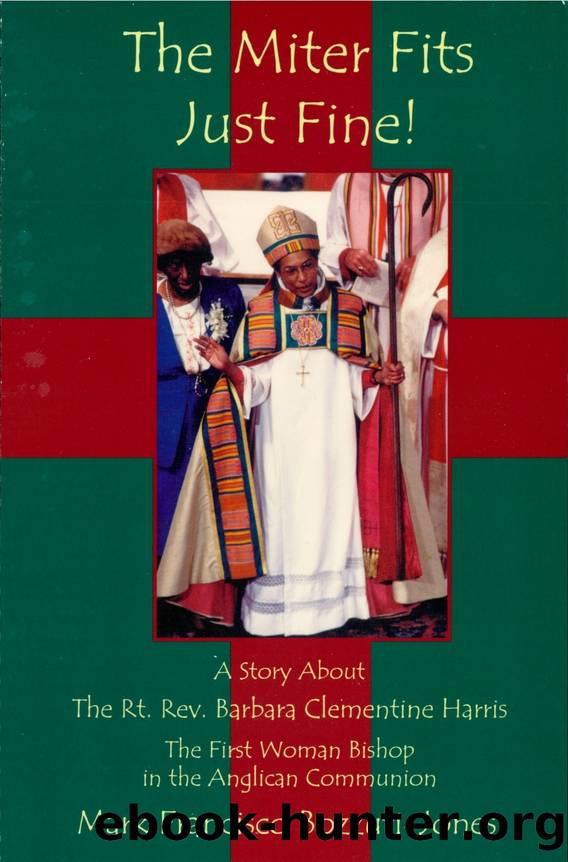Miter Fits Just Fine by Mark Bozzuti-Jones

Author:Mark Bozzuti-Jones [Bozzuti-Jones, Mark]
Language: eng
Format: epub
ISBN: 9781461698692
Publisher: Cowley Publications
Published: 2013-06-26T00:00:00+00:00
From the founding of the United States to the 1960s, religion held tremendous influence over the attitudes of Americans. America was founded as a country where freedom of worship was given the highest value. As the country grew, religion continued to claim its space in the life and psyche of the American people.
For many, church life in the 1900s centered on regular attendance, occasional family events, regular church school and the receiving of the sacraments. Baptism and the Holy Communion were the sacraments the Episcopal Church believed were instituted by Jesus Christ. To be a member of the Protestant Episcopal Church, as the Episcopal Church was then known, one had to be baptized. Baptism was a way of claiming allegiance to Christ and the church community. Baptism, a ritual that involves the pouring of water and profession of faith, was therefore the most important sacrament. Without baptism one could not receive communion or get married in the church. To receive communionâthe sacrament of sharing the bread and wine in memory of Jesusâone had to be baptized.
Many other religious denominations hold similar beliefs, but they differ over who can be baptized. Since its founding, the Episcopal Church has held that children be baptized and that the parents take full responsibility to ensure that the children grow up with a love for the faith.
When Barbara was a child, baptism was just as important as the actual birth of a child, for baptism was the birth of the child into the Christian community. What could be more important than that? Some families wanted baptism as a way to ensure that the child would be claimed by God and protected from evil. Until the last few decades, infant mortality was very high, and so insuring the salvation of the childâwhich many thought was done through baptismâwas a high priority for Christian parents.
Baptism was the distinguishing mark that identified a person as a Christian and as an Episcopalian. Today, many people frequent a church community without feeling the need to be baptized or to become a member of the parish. This was not the case in the 1800s and early 1900s. In those days, most churches required attendance on Sundays. The Episcopal Church was no exception. Ms. Bea went because she believed that the family that prayed together stayed together and she wanted her children to grow up under the formative influence of the church. âThere can be nothing better,â she would say to her children, âthan for all you to stay close to the church no matter what. God has been good to us and you canât go wrong in the church.â
For her, church was the house of God, and was so important that whenever she was pregnant she kept going to church right up to the time of deliveryâso one could say that Barbara had been to church even before she was even born. As Barbara grew up, Ms. Bea explained to her why she felt it was so important to be faithful
Download
This site does not store any files on its server. We only index and link to content provided by other sites. Please contact the content providers to delete copyright contents if any and email us, we'll remove relevant links or contents immediately.
| Africa | Americas |
| Arctic & Antarctica | Asia |
| Australia & Oceania | Europe |
| Middle East | Russia |
| United States | World |
| Ancient Civilizations | Military |
| Historical Study & Educational Resources |
Cecilia; Or, Memoirs of an Heiress — Volume 1 by Fanny Burney(32550)
Cecilia; Or, Memoirs of an Heiress — Volume 2 by Fanny Burney(31949)
Cecilia; Or, Memoirs of an Heiress — Volume 3 by Fanny Burney(31933)
The Secret History by Donna Tartt(19061)
Sapiens: A Brief History of Humankind by Yuval Noah Harari(14372)
Leonardo da Vinci by Walter Isaacson(13321)
The Radium Girls by Kate Moore(12020)
Sapiens by Yuval Noah Harari(5366)
How Democracies Die by Steven Levitsky & Daniel Ziblatt(5217)
The Wind in My Hair by Masih Alinejad(5092)
Homo Deus: A Brief History of Tomorrow by Yuval Noah Harari(4909)
Endurance: Shackleton's Incredible Voyage by Alfred Lansing(4772)
Man's Search for Meaning by Viktor Frankl(4586)
The Silk Roads by Peter Frankopan(4527)
Millionaire: The Philanderer, Gambler, and Duelist Who Invented Modern Finance by Janet Gleeson(4472)
The Rape of Nanking by Iris Chang(4205)
Joan of Arc by Mary Gordon(4104)
The Motorcycle Diaries by Ernesto Che Guevara(4091)
Stalin by Stephen Kotkin(3960)
